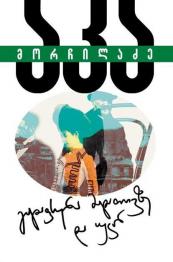FLIGHT TO MAFATOV ISLAND AND BACK
AKA MORCHILADZE
All three Madatov novels are full of allusions to world literature; history is blended with fiction. For example, Knut Hamsun, who wrote about Tbilisi, where he lived in at the end of the 19th century, appears among the fictional characters, as does Ilia Chavchavadze, the famous writer, founder of the first Georgian bank and father of the nation. Many loosely connected parallel stories are set in Tbilisi and the Georgian countryside. Historical and modern times, customs old and new are blended. In the third part of the Madatov trilogy a new dimension is added: the reader discovers that the lengthy and complex history of Madatov Island is nothing but a virtual world, a computer game called Magic Polis. The game is being played by the writer Ishmail Peran, who has been given it by his friend Korben Dallas. Ishmail uses the game to construct the history and development of an entire city over the centuries… until a previously invisible monster concealed in the game devours his world. The first volume Flight to Madatov and Back of Morchiladze’s trilogy, each part of which can also be read separately, was a literary sensation in Georgia. Critics called it the most important novel of the decade. 19th century multi-ethnic and multi-cultural Tbilisi has been divided into two parts: aristocrats dominate one part, while the rest of the city belongs to craftsmen. The novel’s protagonist, an artist called Khapo, lives in a tower by the river with a deaf and dumb boy, whom he passes off as his own son, even though there are nasty rumours that the boy is his servant. Khapo is a well-known craftsman: he works in Tbilisi’s hillside districts, in aristocrats’ houses. Everyone knows him. One day, however, his corpse is found on the mysterious island of Madatov, which lies in the middle of the River Mtkvari, opposite the Hotel London, where the writer Knut Hamsun is staying. Every day Hamsun keeps watch from his window on the island. The island also has a factory and a rubbish dump, where all the city’s rubbish is tipped; the other half of the island is covered with vineyards. The farmers live not far from the factory. Hamsun cannot understand why there is a stench coming from the centre of the city, or how, in a wine-producing country, a vineyard can flourish right next to a rubbish dump. The former owner of the island was a General Madatov, hence its name. Hamsun visits the island and meets two men there, who are obviously not pleased to see him. Bewildered, Hamsun goes back, but decides to visit the mysterious island again. Khapo, a homosexual, often used to visit Madatov for covert meetings. Qorghanov, a lieutenant in the gendarmerie, who has been searching for Khapo’s murderer, has taken Khapo’s boy into his own family and learnt sign language so as to make minimal communication possible. Thanks to the boy, some light is shed on details of Khapo’s scandalous way of life, but the murderer can still not be identified. The novel’s plot is split into three parts: each part consists of its own set of little stories. A new episode often begins with a quotation, which is sometimes from a well-known writer or famous person who has visited Tbilisi and written about it – for instance, Pushkin, Victor Hugo, etc. The stories also reflect figures prominent in the country’s history and politics. For instance, the reader will recognise a young, rebellious trainee priest as Joseph Stalin. In parallel with the detective story (and the work is only partly a detective novel by genre), various social layers, Tbilisi’s multi-lingual community are portrayed in a vivid and authentic way, with Morchiladze’s characteristic moderate irony, laced with humour and sarcasm. The work thus becomes an utterly unique narrative.
‘Madatov itself, in its literal and metaphorical sense, was an island, but at the same time it was something more than one’s native land. Aka Morchiladze has done something very strange in this book. Basically, what he has done for us is to make Madatov the story of an island, and at the same time, in some strange way, it is the story of our country and our people.’
D. Turashvili, author / Radio Liberty
‘Morchiladze has created…a playful mad, vibrant world…’
Die Süddeutsche Zeitung
‘Morchiladze deserves to be read not merely as an example of a Georgian novelist but as a world-class novelist in his own right.’
T. I. Burton / Tweed's Magazine of literature & art
Extract will be available soon
In case of using the information, please, indicate the source.
